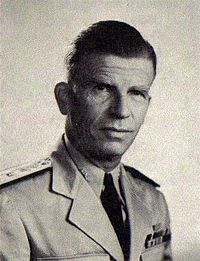- Oscar C. Badger II
-
Oscar Charles Badger II 
Born June 26, 1890
Washington, D.C.Died November 30, 1958 (aged 68) Place of burial Arlington National Cemetery Allegiance  United States of America
United States of AmericaService/branch  United States Navy
United States NavyYears of service 1911 - 1952 Rank Admiral Commands held USS North Carolina
Destroyers, Atlantic Fleet
Service Squadrons, South Pacific
Battleship Division 7
11th Naval District
Eastern Sea Frontier
Naval Forces Western PacificBattles/wars Mexican campaign, Vera Cruz
World War I
World War IIAwards Medal of Honor
Navy CrossRelations Commodore Oscar C. Badger, grandfather
Admiral Charles J. Badger, fatherOscar Charles Badger II (June 26, 1890 – November 30, 1958) was an admiral of the United States Navy who served in both World Wars, and, as a junior officer, received the Medal of Honor.
Contents
Early history
The grandson of Commodore Oscar C. Badger (1823–1899), son of Admiral Charles J. Badger (1853–1932) and a cousin of Secretary of the Navy George E. Badger (1795–1866), Oscar Badger II was born June 26, 1890, in Washington, D.C.[1] He graduated from the United States Naval Academy in 1911.[2]
Veracruz Occupation
As an ensign in USS Utah (BB-31), in 1914 he participated in the U.S. occupation of Veracruz. Several thousand American troops landed, in an effort to force out General Victoriano Huerta, who had seized power in Mexico. Fifty-five men were received the Medal of Honor for this action, including seven leaders of the battleship's 'bluejacket battalion'. Badger was cited, "For distinguished conduct in battle, engagements of Vera Cruz, 21 and April 22, 1914. Ens. Badger was in both days' fighting at the head of his company, and was eminent and conspicuous in his conduct, leading his men with skill and courage."
World War I and interwar service
Badger served with the destroyer force in European waters during World War I. Following the war, he served as gunnery officer on various ships. He was then assigned to duty with the Bureau of Ordnance.
World War II
In 1941, Captain Badger took command of USS North Carolina (BB-55) and in 1942, after promotion to Rear Admiral, was Commander Destroyers Atlantic Fleet and subsequently Assistant Chief of Naval Operations for Logistics Plans. In February 1944 he became Commander Service Squadrons South Pacific and in October Commander Battleship Division 7. Badger was the first Navy officer to step ashore in Japan at the end of World War II.
Postwar service
On January 19, 1948, Badger was promoted to Vice admiral and, the following month, became Commander, Naval Forces, Far East. In that post, he observed the gradual loss of the Chinese mainland to Communist forces and supervised the retirement of American forces to port cities on the China coast. Following his service as commander of Western Pacific naval forces, Badger was appointed as Commander, Naval Forces, Western Pacific, later commanding the Eleventh Naval District, and the Eastern Sea Frontier.
On June 19, 1951, during congressional hearings on the loss of China, Vice-Admiral Badger testified that the U.S. arms embargo against Nationalist China led to a loss of capability and morale that resulted in their defeat by Communist Chinese forces led by Mao Tse-Tung.[3] He retired from the U.S. Navy in June 1952 with the rank of full admiral.
Admiral Badger died on November 30, 1958 and was buried in Section 2 of Arlington National Cemetery.[1]
Officially, USS Badger (FF-1071) was named in honor of all the members of the Badger family who served in the U.S. Navy, but when she was launched in 1968, her sponsor, Isabelle Austen Badger, Adm. Badger's widow, said "I christen thee Oscar Charles Badger II!".[4]
Medal of Honor citation
Admiral Badger received the Medal of Honor for actions in the Mexican-American war December 4, 1915 as an Ensign. The medal was Accredited to: District of Columbia. G.O. No.: 177.
Citation:
For distinguished conduct in battle, engagements of Vera Cruz, 21 and 22 April 1914. Ens. Badger was in both days' fighting at the head of his company, and was eminent and conspicuous in his conduct, leading his men with skill and courage.[5]
See also
- List of Medal of Honor recipients (Veracruz)
Notes
- ^ a b "Oscar C. Badger II", Arlington National Cemetery.
- ^ Notable Graduates, USNA.
- ^ Badger, Oscar C. (Adm), Testimony Before the Senate Joint Committee on Armed Forces and Foreign Relations, Volume XXXVIH (June 19, 1951), pp. 7166-7423
- ^ "USS Badger Namesake", USS Badger 1071.org.
- ^ "Badger, Oscar Charles", CMH.
References
- "Badger, Oscar Charles". Medal of Honor recipients — Mexican Campaign (Vera Cruz). United States Army Center of Military History (CMH). http://www.history.army.mil/html/moh/mohmex.html. Retrieved 2007-10-24.
- "Papers of Admiral Oscar C. Badger, 1948-1970". Naval History & Heritage Command, Department of the Navy. http://www.history.navy.mil/ar/bravo/badger.htm.
- "USS Badger Namesake". USS Badger 1071.org. http://ussbadger-1071.org/menus/oscar.htm.
- "Medal of Honor recipients". Notable Graduates. United State Naval Academy. http://www.usna.edu/Admissions/Notables/MOH/.
- "Oscar Charles Badger". Home of Heroes.com. http://www.homeofheroes.com/gravesites/arlington/badger_oscar.html.
- "Oscar Charles Badger II, Admiral, United States Navy". Arlington National Cemetery Website. http://www.arlingtoncemetery.net/obadger2.htm. Retrieved 2007-10-24.
External links
- "Oscar C. Badger II". Claim to Fame: Medal of Honor recipients. Find a Grave. http://www.findagrave.com/cgi-bin/fg.cgi?page=gr&GRid=6239034. Retrieved 2009-06-05.
Categories:- 1890 births
- 1958 deaths
- American military personnel of World War I
- American military personnel of World War II
- Burials at Arlington National Cemetery
- Recipients of the Navy Cross
- Navy Medal of Honor recipients
- People from Washington, D.C.
- United States Naval Academy alumni
- United States Navy admirals
Wikimedia Foundation. 2010.
